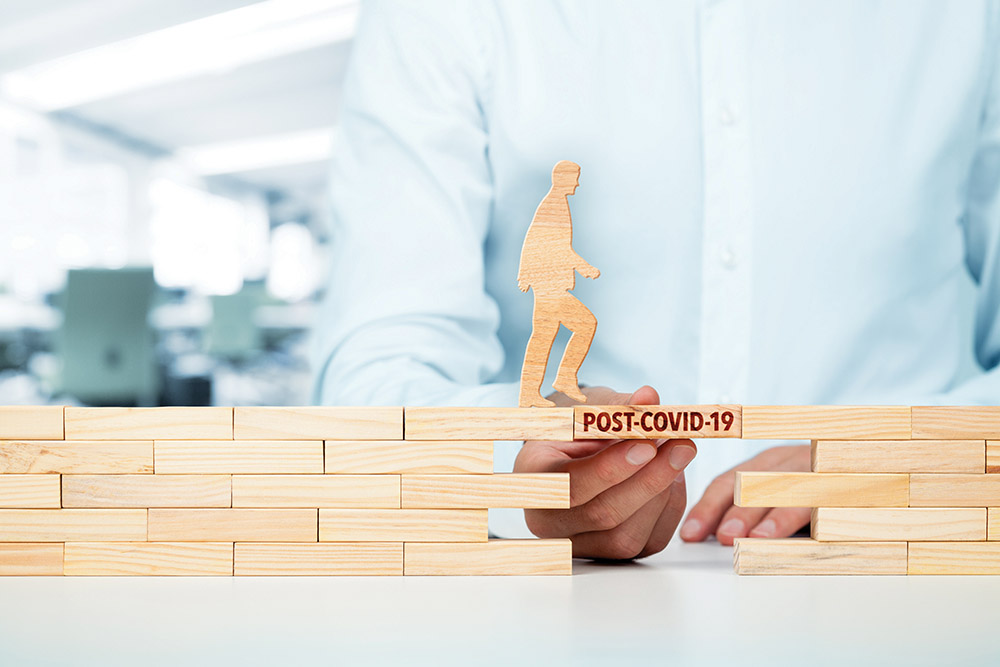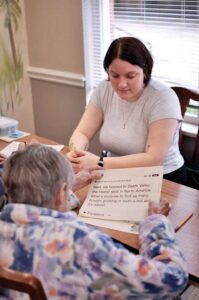Submitted by Annette Morrison, M.S., CRS A/D
Joe waited in line at the Pharmacy for his prescription for 45 minutes, just to be told at checkout that it would still not be ready for another 2 hours. He was so frustrated. But as he watched the two staff behind the counter scramble to catch up on orders, he realized it wasn’t their fault. Our world has changed drastically in the last 3 years. There are more employees who prefer working “remotely” from home than there have ever been in history, leaving many businesses short-staffed with limited services. We have gone from shopping in stores to online with delivery or curbside pickup when possible. Today’s technology has largely made this possible and we are lucky we have such advanced ways to adapt, but most of us overlook the extreme mental health toll that the Pandemic has had on our society—older adults in particular.
The Covid-19 Pandemic, like the Spanish-Flu Pandemic of 1917, is a historical event. There will be research studies, documentaries, and art remembering the social distancing, the lines, the masks, and the vaccination clinics. There will be memorials for those precious lives lost. Expressing our views on what we saw and experienced during the Pandemic is a significant form of therapy that can help us start to heal our minds. Take a minute to really comprehend the massive impact this one virus has had on a global scale at this time in history—on the policies, the leaders, the minorities, and the different socio-economic groups.
Disasters trigger our “flight or fight” response. Sylvia refuses to wear a mask, won’t take PCR or Covid tests anymore and never did believe in the vaccines—a fight response. Rodney is terrified, still, to go back into public for fear of contracting COVID, so he isolates himself—a flight response. A middle ground exists and understanding how the Pandemic affects us mentally is the first step to finding it. The Substance Abuse and Mental Health Services Administration (SAMHSA) has published a brochure titled, Tips for survivors of a Pandemic. It includes sections on Managing Stress, Common Reactions to Disasters, Common Reactions in Children and Teenagers, Tips to Manage Distress After a Pandemic, What to Expect in Your Financial Life, and When to Seek Professional Support. The full brochure can be viewed at https://store.samhsa.gov along with many other valuable resources for substance abuse, mental health, and different ways to approach disasters. Below are a few key segments of this brochure that may help us understand how the Pandemic has affected our emotional reactions and new ways to cope.
“Pandemics and other disasters involve physical danger and also stress that can overwhelm survivors’ usual coping strategies, both during and after the disaster. After a pandemic or other disaster, people often notice changes in how they feel, think, and act, and they may not realize that these changes are reactions to the disaster. Survivors may be at higher risk of intense reactions if they live in communities where many people got sick; they had the disease themselves; or they had health, mental health, or substance use conditions before and during the pandemic. Pandemics, unlike other types of disasters do not have a clear beginning and ending, sometimes leading to increased uncertainty and distress. This tip sheet describes common reactions after pandemics and other disasters and suggests ways to cope. It also covers financial stress and signs of the urgent need for mental health assistance and lists sources of help and support.
Common Reactions to Disasters
Survivors often notice changes in their thinking, feelings, and behavior during and after a disaster, as well as physical signs and symptoms. Changes related to thinking may include nightmares, confusion, trouble making decisions, trouble concentrating, difficulty with remembering things, and inability to listen to others. Changes in feelings may include increased or overwhelming fear, anxiety, depression, irritability and anger, hopelessness, or guilt. Survivors may also experience a sense of disconnection, or not caring about things, as well as inability to feel joy or sadness. Changes in behavior may include having an exaggerated startle response, trouble sleeping, or more arguments with others. Survivors may also notice that they are eating too much or too little, crying more often, having angry outbursts, or spending more time alone. Their substance use may increase. Physical signs and symptoms may include headaches, stomachaches, or diarrhea; loss of appetite; sweating or having chills; tremors (shaking) or muscle twitches; higher or lower energy than usual; or being unable to relax.”
Below are a few excerpts from the Tips to Manage Distress After a Pandemic section:
“Coping skills and strategies can help you deal with the distress that is common among disaster survivors. Modeling these strategies can also help your family through phases of disaster recovery.
Make and use your Connections. Build close relationships with others, especially with those who accept and understand your feelings, and time to enjoy the close relationships you have. Socializing with others can reduce stress and create a sense of support and connection. Try volunteering, visiting family, calling a friend, or reaching out to a faith leader.
Find Purpose. After a disaster there may be time to reflect on what is important to you in life, and to make sure you’re spending the most time on things that matter most to you. Take part in activities you find enjoyable and meaningful, or create a plan to move in that direction.
Have a Flexible Routine. Create a routine or daily schedule. Have a plan to accomplish required tasks, and create a flexible round to accomplish them. Routines provide a sense of control over your life and reduce stress and uncertainty. Flexible routines allow you to accommodate unexpected events or urgent needs that arise while also maintaining a degree of consistency.
Engage in Practices To Relax. Try to meditate, or listen to music as a way to calm yourself. If you’re experiencing acute stress, you may want to try abdominal breathing.
News Intake. Try not to overconsume news. Doing so has been shown to increase stress levels and anxiety. It may be helpful to identify a few sources you trust and plan to consult regularly; stick with those sources; and set a daily time limit for reading, watching, and listening to news.
Sense of Humor. Use humor to reduce stress. Watch a funny movie or podcast, read a good book, or tell a funny joke to someone you know.
Physical Care. Eat healthy meals and snacks, drink plenty of water, and get enough rest. Avoid excessive amounts of caffeine and alcohol. Model these behaviors for your family.
Exercise. Set aside time for regular exercise or other physical activity, as research shows this reduces stress and anxiety while also boosting physical health. If your schedule doesn’t allow for long segments of activity, take a couple of 5-minute walks instead. Try to make regular physical activity a part of your everyday routine.
Get Outside. Visit a local park or other beautiful space. Find time to step outside regularly and move around. The fresh air will decrease stress while providing a boost to physical and mental health.
Write in a Stress Journal. Take 15–20 minutes each day to reflect upon stress and write down your thoughts and feelings. If you take time during the day to address stress, it is less likely at night to interfere with sleep.”
This also reads like a perfect list of New Year’s resolutions, but really it is a master list for trying to keep a healthy outlook on trials, tribulations, and life. As we embark on a New Year of hope, CCSI Case Coordination LLC wishes everyone the best of health—physical, spiritual, and mental.
CCSI Case Coordination, LLC provides Central Point of Entry, Case Management, Caregiver Advisory, Geriatric Counseling and Senior Information Services for older adults and individuals who are disabled age 16–59 in McLean, Livingston, DeWitt, and Shelby Counties. If you know someone in need of assistance, please have them call CCSI at 309-661-6400. Our main office is located at 3601 General Electric Road, Suite 2, Bloomington, IL 61704.
For additional informative and inspirational articles, visit 50 Plus News and Views Bloomington Normal online edition today.










